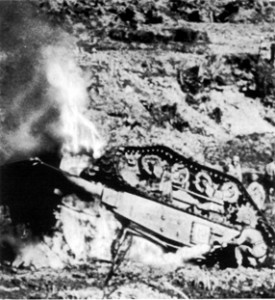
Month: August 2013
A very small constitutional earthquake
By now, there can be nobody in the United States who is even remotely interested in foreign affairs who does not know that on Thursday the government in Britain suffered a defeat in the House of Commons with a clearly hostile debate in the House of Lords over the question of whether to intervene militarily in Syria.
Much has been made that this is the first defeat for a government over matters of war since some imbroglio in the eighteenth century when the Prime Minister was Lord North. The reason is actually simple: the government does not have to go to Parliament over either declaration of war and actual acts of war. These come under the Royal Prerogative, which is now vested in the government of the day and all attempts to change that through legislation have failed. However, Tony Blair found it necessary to ask Parliament (several times) about the war in Iraq and got his authorization. It would have been impossible for David Cameron to do otherwise but his case was quite genuinely not good enough to pass muster.
I wrote a blog a few days ago, in which I put together some of the questions that, in my opinion, those clamouring for intervention needed to answer. This has not happened to any acceptable degree and even after the vote, those who are hysterically lambasting the MPs refuse to do so, constantly shifting the ground as to why we should intervene.
Since the vote, which was immediately accepted by the Prime Minister, possibly with secret relief, I became involved in ferocious disputations on the subject. In the end I decided to sum up the situation as I saw it in another, rather long, blog. It is largely about the situation as far as Britain is concerned so it may be of interest to readers of this blog.
For the record, I do not think this is the end of the Special Relationship, which exists on many more levels than political posturing. As I say in the blog, if it survived Harold Wilson’s premiership, it will survive the Obama presidency. Some things are more important than immediate and confused politicking.
History Friday: Technological Surprise & the Defeat of the 193rd Tank Battalion at Kakuzu Ridge
In April 1945 the US Army’s 27th Infantry Division launched an attack against the Kakuzu Ridge position held by the Imperial Japanese Army on Okinawa with the 193rd Tank Battalions 30 thirty tanks, self-propelled assault guns, and attached armored flame throwers from the 713th Flame Tank Battalion. When the battle was over, 22 of the 30 armored fighting had been destroyed in a coordinated ambush by Japanese anti-tank guns, artillery, mortars and suicide close assault teams. Among the dead was the battalion commander of the 193rd, on whom blame was laid for attacking without American infantry in close support. This battle is referenced in almost every narrative account of Okinawa as proof of the tougher defenses American soldiers and marines would face in an invasion of Japan.

It turns out that while this particular narrative has a great deal of truth, it isn’t the whole truth and hides the most important one. In a photo film negative image of British Prime Minister Winston Churchill’s comment that “In war, The Truth must have a bodyguard of lies,” This narrative has a huge lie buried in a bodyguard of truth.
The most important truth of this battle was that American troops suffered a technological surprise. The Japanese were listening to the SCR-300, SCR-500 and SCR-600 series frequency modulated (FM) radios of American infantry, tanks and artillery forward observers at Kakuzu Ridge (and other battles through out the Pacific in 1945) with Japanese Type 94 (1934) Mark 6 walkie-talkie radio that was issued to every Japanese infantry battalion.
Six Hundred Million Years in K-12
(This rerun is in honor of the beginning of the new school year…indeed, many kids have now already been in school for 3 weeks or even more.)
Peter Orszag, who was Obama’s budget director and is now a vice chairman at Citigroup, thinks it would be a good idea to cut back on summer school vacations for kids, arguing that this would both improve academics and reduce obesity.
I’m with Jeremy Lott: But to look at the vast wasteland that is American public education — the poor teaching, the awful curriculum, the low standards, the anemic achievement, the institutional resistance to needed reform — and say that the real problem is summer vacation takes a special sort of mind.
I wrote about the war on summer vacation back in 2006, after stopping at a store in Georgia on the first day of August and discovering that this was the first day of school for the local children. In this post, I said:
The truth is, most public K-12 schools make very poor use of the time of their students. They waste huge proportions of the millions of hours which have been entrusted to them–waste them through the mindless implementation of fads and theories, waste them through inappropriate teacher-credentialing processes, waste them through refusal to maintain high standards of performance and behavior.
When an organization or institution proves itself to be a poor steward of the resources that have been entrusted to it, the right answer is not to give it more resources to waste.
Orszag and similar thinkers seem to have no concept that good things can happen to children’s development outside of an institutional setting. Plenty of kids develop and pursue interests in science, literature, art, music…plus, there is plenty to be learned simply by interacting with friends in an unstructured environment.
Would the world be better off if Steve Wozniak and Jeri Ellsworth..to name only two of many, many examples..had their noses held constantly to the school grindstone rather than having time to develop their interests in electronics?
Lewis E Lawes, who was warden of Sing Sing prison from 1915 to 1941, wrote an interesting book titled Twenty Thousand Years in Sing Sing. The title refers to the aggregate lengths of the sentences of the men in the prison at a typical particular point in time.
Lawes:
Twenty-five hundred men saddled with an aggregate of twenty thousand years! Within such cycles worlds are born, die, and are reborn. That span has witnessed the evolution of the intelligence of mortal man. And we know that twenty thousand years have seen nations run their courses, perish, and give way to their successors. Twenty thousand years in my keeping. What will they evolve?
Following the same approach, the aggregate length of the terms to be spent in K-12 schools by their current students is more than 600,000,000 years. What proportion of this time is actually used productively?
And how many of the officials who supervise and run the public schools, and the ed-school professors who influence their policies, think about this 600,000,000 years in the same serious and reflective way that Lawes thought about the 20,000 years under his supervision? Some do, of course, but a disturbing percentage of them seem to be simply going through the bureaucratic motions.
And the politicians and officials of the Democratic Party are the last people in the world who are ever going to call them on it.
Daniel Hannan: Channeling America 3.0!
Daniel Hannan is an internationally renowned voice of liberty. He is a Euroskeptic Conservative Euro MP for Southeast England, a writer for the Daily Telegraph, the author of several books, most importantly, an upcoming book called Inventing Freedom: How the English-Speaking Peoples Made the Modern World
. I have pre-ordered mine and I STRONGLY encourage you to do the same.
Mr. Hannan has informed us that his book and America 3.0 have shared intellectual foundations. We cannot wait to read it.
In the meantime, he had a terrific review today of a book about Russian colonization in North America called Glorious Misadventures: Nikolai Rezanov and the Dream of a Russian America.
Mr. Hannan’s review contained a great concise summary of a point we made in America 3.0, when discussing why the Russian lodgment in North America did not take root:
The American settlers had an advantage over every rival power: they administered their affairs locally. Dispersed land-ownership, elected town leaders, common law, religious pluralism, free contract, county militia: these made up an Anglosphere toolkit better suited to expansion than any rival model. Small wonder that contemporary Americans thought in terms of a manifest destiny.
Yes. Yes, exactly so.
We understand his review of America 3.0 is forthcoming, and we are looking forward to it.
